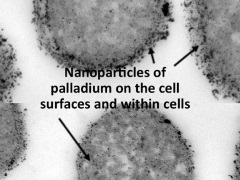Features
Precious support for bio-oil
Date: 2017-08-31 11:25:55.0
Author: Jon Evans

Palladium nanoparticles on D. desulfuricans
cells.
Image courtesy of Lynne Macaskie.
The precious metal palladium has proved to be an effective catalyst for upgrading bio-oil. This includes the bio-oil produced by heating plant biomass in the absence of oxygen and the oil naturally produced by algae. In both cases, the oil can be transformed into a more fuel-like substance, containing a greater abundance of useful hydrocarbons, by heating it under pressure in the presence of hydrogen over palladium nanoparticles. This process, known as hydrothermal liquefaction, removes unwanted oxygen and nitrogen from the oil and replaces it with hydrogen.
Unfortunately, hydrothermal liquefaction isn’t cheap, mainly because commercial palladium catalysts are quite expensive. This is not only due to the high cost of palladium, but is also due to the expense of the carbon-based material that provides physical support for the palladium nanoparticles. Now, a team of researchers from the US, the UK and Denmark, led by Brajendra Sharma at the University of Illinois at Urbana-Champaign, has shown that bacteria can make a much cheaper but just as effective support.
"Instead of using commercially produced carbon particles, we can use bacteria cell masses as a sort of biologic scaffolding for the palladium to hold on to," explained Sharma. "The oil can flow through the palladium-decorated bacteria masses as it does through the carbon particles."
To prepare their novel catalyst, Sharma and his team simply reduced a solution of sodium
tetrachloropalladate (Na2PdCl4) over cells of the anaerobic soil bacterium Desulfovibrio desulfuricans. This caused the bacteria to become covered in palladium nanoparticles around 3nm in size. Finally, the scientists dried the bacteria and ground them into a powder.
The scientists tested this bio-catalyst on algae oil, comparing it with a commercial palladium catalyst. As they report in Fuel, both catalysts were just as effective at upgrading the algal oil, able to reduce the oxygen content by 72% and the nitrogen content by 52% and increase the concentration of fuel-like hydrocarbons from 30% to 45%.
The only downside was that the bio-catalyst was more fragile than the commercial catalyst, becoming damaged by the high temperatures used in hydrothermal liquefaction. This meant that, unlike the commercial catalyst, the bio-catalyst couldn’t be used more than once. Nevertheless, although the catalyst couldn’t be reused, the palladium in the catalyst can be readily extracted and recycled, and then simply incorporated into a new load of bacteria. Sharma and his team showed that this could be done, but didn’t test the performance of the recycled bio-catalysts.
"It is a minor caveat," claimed Sharma. "The fact that we have shown the potential of making refinery-ready crude oil from algae bio-oil using a catalyst that can be prepared from low-grade recycled metals and green and economical bacterial biomass proves that this is a very promising advancement."
In fact, the whole catalyst could be made from recycled material, making it even cheaper. Although Sharma and his team used D. desulfuricans as their support, they say that many other bacteria should also make effective supports. This raises the possibility of using bacteria grown commercially for another purpose, such as to produce drugs or clean up pollution, as a support when they’ve reached the end of their productive life.
The palladium can also be recovered from waste material such as old electronics and catalytic converters, offering another way to save costs. Sharma and his team even raised the possibility of killing two birds with one stone, by using bacteria that can absorb metals from the environment to produce catalysts that already contain all the palladium they need.
The views represented here are solely those of the author and do not necessarily represent those of John Wiley and Sons, Ltd. or of the SCI.
Displaying 1 keywords used to tag this article:
- Replica Omega Seamaster Planet Ocea
